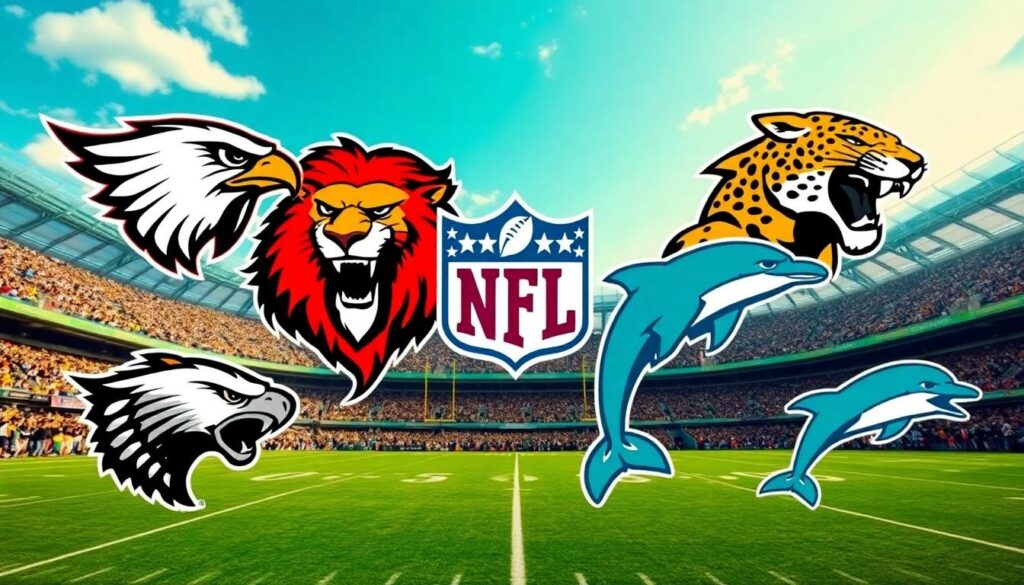When we think of the NFL, powerful animal mascots often roam our minds. From ferocious birds of prey to mighty jungle cats, animal-themed team names have become an integral part of football identity, representing strength, agility, and competitive spirit.
We’ve compiled a comprehensive look at NFL teams named after animals – exploring their histories, the significance behind their chosen creatures, and how these mascots have shaped team cultures. Whether you’re a die-hard Ravens fan or cheer for the Bengals, there’s something fascinating about why these franchises chose nature’s predators to represent them on the gridiron.
The Fierce Birds: NFL Teams Named After Aerial Predators
The NFL features several teams named after powerful birds of prey, representing speed, vision, and hunting prowess on the football field. These aerial predators make perfect mascots for teams looking to embody strength and precision.
The Philadelphia Eagles: Symbolizing American Freedom
The Philadelphia Eagles, established in 1933, take their name from the bald eagle featured on the Blue Eagle insignia of the National Recovery Administration. This majestic bird serves as America’s national symbol, representing freedom, courage, and strength. Eagles owner Bert Bell deliberately chose this patriotic mascot to inspire his team and connect with American values during the Great Depression era. Since adopting this powerful identity, Philadelphia has captured three NFL Championships and one Super Bowl title. Their midnight green, silver, and black uniforms feature a striking eagle head profile that’s instantly recognizable to football fans nationwide.
The Atlanta Falcons: Speed and Precision
The Atlanta Falcons entered the league in 1966 after a naming contest where “Falcons” emerged as the winner. Team leadership embraced this name because falcons are known for their incredible speed and deadly hunting accuracy. These birds can dive at speeds exceeding 200 mph, making them nature’s perfect metaphor for an explosive football offense. Atlanta’s team colors of red, black, and silver complement their predatory identity. The franchise has reached the Super Bowl twice and maintains a passionate fanbase throughout Georgia and the Southeast. Their iconic logo has evolved over time but always maintains the distinctive falcon silhouette in attack position.
The Seattle Seahawks: Pacific Northwest Predators
Seattle’s team name originated from a public naming contest in 1975 that generated over 20,000 submissions. The “Seahawks” moniker refers to the osprey, a fish-eating hawk native to the Pacific Northwest region. This coastal raptor perfectly represents Seattle’s maritime culture and connection to the Puget Sound. Seahawks’ distinctive navy blue, action green, and wolf gray color scheme draws inspiration from the natural industry surrounding the city. Their logo design incorporates Native American artistic elements, creating one of the most recognizable symbols in professional sports. Seattle has built a fearsome reputation, winning Super Bowl XLVIII and creating the “12th Man” home-field advantage that’s among the NFL’s most intimidating environments.
The Arizona Cardinals: A Legacy of Red Birds
The Arizona Cardinals hold the distinction of being the NFL’s oldest continuously run franchise, dating back to 1898 in Chicago. Their name originated when team founder Chris O’Brien purchased used maroon jerseys from the University of Chicago, declaring the faded color “cardinal red, not pink.” Cardinals are known for their striking appearance rather than predatory nature, representing beauty and resilience in the desert industry. After relocating from Chicago to St. Louis and finally to Arizona in 1988, the team maintained its cardinal identity throughout its storied history. Their current uniforms feature a fierce cardinal head logo and the team reached Super Bowl XLIII following the 2008 season.
The Baltimore Ravens: Inspired by Edgar Allan Poe
The Baltimore Ravens began play in 1996 after fans selected their name through a contest that drew more than 33,000 submissions. Their identity pays homage to Edgar Allan Poe’s famous poem “The Raven,” as the renowned author lived and died in Baltimore. Ravens themselves are remarkably intelligent birds known for problem-solving abilities and complex social structures. The team embraces their literary connection while building a reputation for defensive excellence and toughness. Baltimore has captured two Super Bowl championships (XXXV and XLVII) while donning their distinctive purple, black, and gold uniforms. Their raven logo, featuring a menacing profile with a purple “B” embedded in the design, perfectly encapsulates the team’s fierce identity and connection to their city’s cultural heritage.
The Wild Cats: NFL Teams With Feline Mascots

Four NFL franchises proudly bear the names of powerful feline predators, embodying the speed, agility, and fierce competitiveness these magnificent creatures represent on the gridiron.
The Carolina Panthers: Strength and Stealth
The Carolina Panthers organization selected their name to symbolize the strength, stealth, and agility associated with the powerful panther. Their beloved mascot, Sir Purr, brings this feline energy to life during home games at Bank of America Stadium. Panthers as predators are known for their calculated hunting approach, mirroring how a successful football team strategically attacks its opponents with precision and power.
The Detroit Lions: Kings of the NFC North
Detroit’s NFL franchise embraces the lion, often called the king of the jungle, representing dominance and raw power on the football field. The team’s mascot, Roary, energizes the Ford Field crowd with the same ferocious spirit the players aim to display against their divisional rivals. Lions in the wild command respect through their strength and pride-based social structure, qualities the Detroit organization strives to embody in their franchise culture and team identity.
The Cincinnati Bengals: Striped Predators
Cincinnati’s team name draws inspiration from the magnificent Bengal tiger, instantly recognizable for its distinctive orange and black striped coat. Their mascot, Who Dey, rallies fans with the same fierce determination these predators show in their natural habitat. Bengal tigers represent not only raw power but also calculated hunting precision, characteristics the Cincinnati franchise hopes to display through their offensive and defensive strategies on the field.
The Jacksonville Jaguars: Florida’s Spotted Hunters
The Jacksonville Jaguars franchise pays homage to the jaguar, a powerful spotted cat native to the Americas known for its hunting prowess. Their animated mascot, Jaxson de Ville, brings excitement to TIAA Bank Field with acrobatic stunts that reflect the agility of this formidable predator. Jaguars possess remarkable strength relative to their size, able to take down prey much larger than themselves—a fitting symbol for an NFL team looking to overcome bigger market opponents through speed and tactical excellence.
The Hoofed Heroes: NFL Teams Named After Horned Animals

Several NFL franchises draw inspiration from powerful hoofed animals, embodying the strength, speed, and tenacity these creatures represent. These teams have built their identities around animals known for their impressive horns or hooves, creating memorable mascots that resonate with fans.
The Denver Broncos: Wild Horses of the West
The Denver Broncos take their name from the untamed horses of the American West, perfectly capturing the rugged spirit of their region. Broncos specifically refers to wild, untrained horses, symbolizing freedom, power, and the untamable nature that defines the team’s identity. Their mascot embodies the frontier heritage of Colorado and the Rocky Mountain region, connecting the franchise to the historical significance of horses in western expansion. With their distinctive orange and blue colors, the Broncos have established themselves as one of the NFL’s most recognizable teams with a name that pays homage to the wild equines that once roamed freely across the western plains.
The Indianapolis Colts: Young Horses With a Winning Legacy
The Indianapolis Colts derived their name from the term for young male horses, reflecting the city’s deep connection to horse breeding and racing traditions. Their name was specifically chosen to highlight Indiana’s rich equestrian history, with “colt” representing youth, energy, and tremendous speed on the field. The team’s iconic horseshoe logo further reinforces this equine connection, serving as a symbol of good fortune and the powerful stride of their namesake animal. Indianapolis embraced this identity when the franchise relocated from Baltimore, maintaining the Colts name that perfectly captures the youthful vigor and swift movement that characterizes their playing style.
The Los Angeles Rams: Headstrong Competitors
The Los Angeles Rams draw their name from male sheep known for their impressive curved horns and determined nature. This name originated when the team was based in Cleveland, selected by team owner Homer Marshman who won a naming contest with “Rams” as his entry. These animals are celebrated for their strength and headstrong personality, qualities that translate well to the competitive nature of professional football. Their logo prominently features the distinctive spiral horns that make rams immediately recognizable, symbolizing the aggressive, charging style of play fans expect from the team. The Rams’ identity perfectly encapsulates the determination and physical power needed to succeed in the NFL.
The Buffalo Bills: Named After the American Bison
The Buffalo Bills represent a unique case where the team’s name has a dual connection to both animal and human history. While technically named after frontiersman Buffalo Bill Cody rather than the animal itself, the team has fully embraced the American bison in their identity. Their logo prominently features the massive hoofed animal that once dominated the Great Plains industry. Bison symbolize strength, endurance, and the rugged American frontier spirit—qualities the team strives to embody on the field. Fans connect with this powerful symbol of American heritage, making the buffalo one of the most recognizable animal mascots in professional sports, even though the indirect nature of the team’s naming origin.
The Ocean Dwellers: NFL Teams With Marine Animal Mascots

The Miami Dolphins: Intelligent Ocean Athletes
The Miami Dolphins stand alone as the NFL’s only franchise named after a marine animal. Their unique identity celebrates one of the ocean’s most intelligent creatures, known for exceptional social behavior and remarkable agility in water. T.D. (The Dolphin), the team’s beloved mascot, has become a central figure in the franchise’s community engagement efforts, regularly appearing at games and local events throughout South Florida. Hard Rock Stadium serves as the home field for this distinctive team whose aquatic theme sets them apart in a league dominated by land-based animal mascots. The dolphin’s natural attributes—intelligence, teamwork, and athletic prowess—perfectly embody the qualities essential for success on the football field, making it an inspired choice for Miami’s NFL franchise.
The Mythical And Extinct: NFL Teams With Legendary Animal Names

While most animal-inspired NFL team names draw from living creatures, some franchises take inspiration from mythology or have embraced symbols that transcend typical wildlife classifications.
The Tennessee Titans: Named After Ancient Greek Titans
The Tennessee Titans stand apart from other NFL teams by drawing their identity from ancient Greek mythology rather than the animal kingdom. Originally known as the Houston Oilers, the franchise underwent a complete rebranding after relocating to Tennessee. Their name pays homage to the powerful Titans of Greek mythology, immortal giants who ruled before the Olympian gods. Though not technically an animal-based mascot, the Titans’ branding incorporates strength and legendary status that parallels many animal-named teams. The franchise made this important name change to establish a new identity that would resonate with their Tennessee fan base while maintaining an image of power and dominance. We can see how this mythological inspiration provides the team with a unique position among NFL franchises that typically rely on real animals for their team identities.
The Evolution of Animal Mascots in NFL History

The history of animal mascots in the NFL represents a fascinating journey spanning several decades. From humble beginnings to becoming integral parts of team identity, these mascots have significantly shaped the league’s culture and fan experience.
Why Teams Choose Animal Names
NFL franchises select animal names for multiple strategic reasons. Symbolism plays a crucial role, as animals naturally embody qualities like strength, speed, agility, and power—attributes every football team aspires to display on the field. Local significance often influences these choices, creating meaningful connections to a team’s hometown heritage, as exemplified by the Baltimore Ravens’ name inspired by Edgar Allan Poe’s famous poem reflecting the city’s literary history. Fan engagement represents another major motivation, since animal mascots naturally create opportunities for exciting game-day experiences and memorable branding elements. Teams understand that animals resonate with fans across all age groups, making merchandise more appealing and creating instantly recognizable symbols that transcend language barriers. The selection process typically involves careful consideration of what animal best represents the team’s desired image and competitive spirit.
How Animal Mascots Shape Team Identity
Animal mascots fundamentally transform a team’s public perception and marketing approach. Brand recognition receives an immediate boost from distinctive animal characters like Staley Da Bear and Rampage, who appear prominently on merchandise, at games, and during community events. Fan culture flourishes around these beloved figures who participate actively in pre-game celebrations and halftime activities, creating traditions that span generations of supporters. Marketing campaigns leverage these animal personas for maximum promotional impact, helping teams attract new audiences while maintaining core fan loyalty. The mascot’s physical presence at games creates memorable moments for young fans, often becoming their first connection to the team. Stadium atmospheres benefit tremendously from these characters, who rally crowds during crucial moments and maintain energy during slower periods of play. Over time, these animal mascots become so intertwined with team identity that fans often identify themselves through these symbols, proudly embracing nicknames derived from their team’s animal representation.
Fan Culture Around Animal-Named NFL Teams

Animal-named NFL teams have developed rich fan cultures centered around their mascots, creating distinctive identities that resonate with supporters across the country.
Merchandise and Mascot Popularity
Team merchandise featuring animal mascots dominates sales for these 14 NFL franchises. Cincinnati’s beloved Bengal tiger mascot “Who Dey” appears prominently on a wide range of fan gear, becoming a recognizable symbol of team pride. The Miami Dolphins stand out with their unique approach, incorporating a dolphin in a football context throughout their branded products, creating a distinctive aesthetic compared to other animal-themed teams. Even teams like the Buffalo Bills, whose name honors frontiersman Buffalo Bill Cody rather than the animal itself, feature mascots like Billy Buffalo prominently in their merchandise lineup. These animal representations have become powerful brand assets that fans eagerly display on everything from jerseys to home décor.
Game Day Traditions and Animal Themes
Game day experiences for animal-named teams incorporate memorable traditions that celebrate their mascots. Jacksonville Jaguars fans witness a spectacle when a live jaguar roars before kickoff, creating an intimidating atmosphere that embodies the predatory spirit of their namesake. Carolina Panthers supporters rally around their “Keep Pounding” drum tradition while panther imagery and sounds enhance the stadium experience throughout game day. Seattle’s famous “12th Man” fan base contributes to one of the NFL’s most hostile environments for opposing teams, with seahawk sounds amplifying the already deafening crowd noise. Fans frequently dress in elaborate animal-themed costumes, further immersing themselves in these distinctive team cultures. Social media communities dedicated to these teams actively share and celebrate their animal identities, extending the fan experience beyond game day and into daily life for devoted supporters.
The Marketing Power of NFL Teams Named After Animals

Animal-themed NFL teams leverage powerful imagery to create unforgettable brands. Out of 32 NFL franchises, 14 teams have strategically chosen animal names to establish strong connections with their fan bases.
Brand Recognition Through Animal Imagery
NFL teams with animal names enjoy exceptional brand recognition through their distinctive visual identities. The Philadelphia Eagles, Atlanta Falcons, and Seattle Seahawks use powerful bird imagery in their logos, making them instantly recognizable among football fans across America. These animal logos create a strong visual shorthand that fans immediately associate with their favorite teams, regardless of whether they see it on a television broadcast or merchandise. Animal-themed branding also creates tremendous merchandising opportunities, with fans eagerly purchasing jerseys, hats, and other apparel featuring these iconic animal logos. Teams like the Chicago Bears and Detroit Lions effectively capitalize on the strength and ferocity associated with their animal names, creating intimidating brand personas that resonate with their fan bases. Market research consistently shows that teams with clear, recognizable animal imagery tend to perform better in merchandise sales compared to more abstract team names.
Connecting With Fans Through Animal Symbolism
Animal symbolism helps NFL teams forge deeper emotional bonds with their supporters through shared cultural meanings. The Baltimore Ravens symbolize mystery and intelligence while the Carolina Panthers represent agility and power, allowing fans to connect with these inherent qualities on a subconscious level. Teams often select animals that reflect their local culture or regional history, such as the Seattle Seahawks, whose name references a bird native to the Pacific Northwest. This regional connection strengthens community identity and gives fans a sense of local pride whenever they support their team. Live mascots and game-day traditions further enhance fan engagement, with characters like the Cincinnati Bengals’ “Who Dey” becoming beloved figures that embody team spirit during games. Fan sections often adopt animal-related nicknames and behaviors, creating unified cheering sections that contribute to home-field advantage. Psychological studies suggest that animal symbolism in sports helps fans identify with positive traits like courage, strength, and determination, making animal-named NFL teams particularly effective at building loyal, emotionally invested fan communities.
Future Possibilities: Potential Animal Names for New NFL Teams

As the NFL continues to evolve, future expansion teams have exciting opportunities to adopt animal-themed identities that resonate with fans and communities.
Endangered Species Awareness Through Sports
NFL teams named after endangered species could create powerful platforms for conservation advocacy. Teams adopting such names would naturally incorporate educational content into their branding through logos, uniforms, and stadium displays that highlight conservation efforts. Partnerships with local and national conservation organizations could help community outreach events that educate fans about the importance of protecting threatened species. Charitable initiatives sponsored by these teams would support real-industry conservation efforts through donations and fundraising events. Imagine a team called the “Florida Manatees” or “California Condors” that uses its visibility to shine a spotlight on these vulnerable species while building a distinctive team identity.
Regional Animals as Team Identity Markers
Regional wildlife offers rich potential for creating authentic team connections to local communities. Teams named after animals native to their geographic regions instantly establish strong territorial identities that resonate with local fans. The cultural significance of regional animals provides teams with ready-made symbols that enhance community pride and team spirit. For example, a Pacific Northwest expansion franchise might adopt names like the “Cascades Cougars” or “Portland Pumas” to celebrate indigenous wildlife. Marketing advantages naturally follow teams with regionally-exact animal names, as these identities create authentic distinctions in the competitive sports industry. Animals with historical importance to an area provide even deeper connections, such as a Southwestern team potentially adopting “Desert Coyotes” or “Sonoran Bobcats” as their moniker.
Comparing NFL Animal Teams to Other Sports Leagues
Animal mascots have become an iconic part of NFL culture with 14 franchises drawing strength from these powerful symbols. They’ve transformed from simple team names into cultural phenomena that forge deep connections between franchises and fanbases.
These animal-inspired teams showcase remarkable marketing prowess through distinctive branding that drives merchandise sales and creates unforgettable game-day experiences. The symbolism extends beyond team identity to represent regional pride and local heritage.
Whether it’s birds of prey soaring above stadiums birds of prey soaring above stadiums felines stalking their prey or powerful hoofed animals charging forward NFL animal mascots continue to captivate fans. They’ve become more than symbols – they’re now the beating heart of passionate fan communities that make the NFL experience truly special.
Frequently Asked Questions
Which NFL teams are named after birds of prey?
The NFL has five teams named after birds of prey: the Philadelphia Eagles, Atlanta Falcons, Seattle Seahawks, Arizona Cardinals, and Baltimore Ravens. Each team’s mascot represents qualities like speed, precision, and hunting prowess that translate well to football competition. The Eagles symbolize American freedom, the Falcons represent explosive offensive play, the Seahawks reflect maritime culture, the Cardinals embody beauty and resilience, and the Ravens pay homage to Edgar Allan Poe.
Why do NFL teams choose animal mascots?
NFL teams choose animal mascots because they symbolize desirable athletic qualities like strength, speed, and agility. Animals provide instantly recognizable imagery that creates strong brand identity and resonates with fans. Local significance also plays a role, as teams often select animals native to their region to foster community connections. Animal mascots are highly marketable, memorable, and help create distinctive traditions that enhance the overall fan experience and team culture.
Which NFL team has the oldest animal mascot?
The Arizona Cardinals hold the distinction of being the oldest continuously run franchise in the NFL with an animal mascot. Founded in 1898 as the Morgan Athletic Club, the team adopted the Cardinals name in 1901 due to their faded red uniforms. The cardinal represents beauty and resilience in football terms, symbolizing the team’s enduring presence in the league despite facing numerous challenges throughout their long history.
What feline mascots exist in the NFL?
Four NFL teams have feline mascots: the Carolina Panthers (Sir Purr), Detroit Lions (Roary), Cincinnati Bengals (Who Dey), and Jacksonville Jaguars (Jaxson de Ville). Each mascot embodies distinct cat qualities—Panthers represent stealth and calculated hunting, Lions symbolize dominance and raw power, Bengals draw inspiration from tiger strength and determination, and Jaguars showcase hunting prowess and agility. These mascots enhance team identity and fan engagement.
Are there any NFL teams named after marine animals?
The Miami Dolphins are the only NFL franchise named after a marine animal. Their mascot, T.D. (The Dolphin), celebrates one of the ocean’s most intelligent creatures known for exceptional social behavior and agility. This unique aquatic theme sets the Dolphins apart in a league dominated by land-based animal mascots. The dolphin symbolism effectively represents qualities essential for football success—intelligence, teamwork, speed, and adaptability.
Which NFL teams feature hoofed animals as mascots?
Four NFL teams use hoofed animals as mascots: the Denver Broncos (wild horses), Indianapolis Colts (young horses), Los Angeles Rams (male sheep), and Buffalo Bills (American bison). The Broncos embody the rugged spirit of the American West, the Colts reflect Indiana’s equestrian heritage and symbolize youth and speed, the Rams represent determination and strength, and the Bills adopted the bison as a symbol of endurance and ruggedness.
How do animal mascots benefit NFL team marketing?
Animal mascots create exceptional marketing advantages through distinctive visual identities that enhance brand recognition and merchandise sales. They forge deeper emotional connections with fans by leveraging powerful animal symbolism that resonates with human psychology. Animal mascots also connect teams to local culture and regional history, while live mascots and related game-day traditions boost fan engagement. This creates unified cheering sections that contribute to home-field advantage.
Are there any NFL teams named after mythological creatures?
Yes, the Tennessee Titans draw inspiration from mythology rather than real animals. Named after the powerful Titans of ancient Greek mythology, their branding emphasizes strength and legendary status. This provides a unique identity among franchises that typically rely on real animals. The rebranding from the Houston Oilers to the Titans reflects the team’s desire to resonate with their Tennessee fan base while maintaining an image of power and dominance.
How have animal mascots evolved in NFL history?
Animal mascots have evolved from simple team names to comprehensive brand identities that encompass costumed performers, logos, and elaborate game-day traditions. Early mascots were basic representations, but modern versions are sophisticated character ambassadors who engage with fans year-round. They’ve become integral to team identity, appearing in community outreach programs, merchandise, and digital content. This evolution reflects the growing importance of fan engagement and brand development in professional sports.
Could future NFL expansion teams use endangered species as mascots?
Future NFL expansion teams could definitely adopt endangered species as mascots, which would create unique branding opportunities while raising awareness for conservation efforts. Teams could incorporate educational content about their mascot species into their marketing, stadium displays, and community programs. This approach would resonate with environmentally conscious fans while creating distinctive team identities. Potential examples might include teams named after wolves, condors, or other threatened species with compelling physical attributes.







